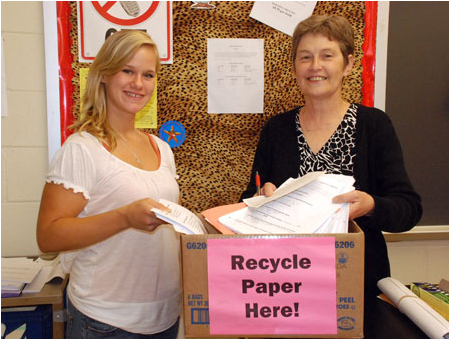When I was in my first year of high school, I started a club to promote recycling and beautification within my community. Just three years later, at the age of 17, I sued my state of Pennsylvania for not taking adequate actions to address climate change. All the while, I lived below the poverty line in a small Appalachian community where environmental endeavors were not always thought about or smiled upon.
Who inspired me to dive so deeply into environmentalism, supported my efforts and ideas? A science teacher.
 Specifically, Mrs. Hoffer, my ninth grade biology teacher. She helped me form a club, “Pollution Patrol,” to clean up the litter lining many of the roads in town. Mrs. Hoffer promoted the planned cleanups in class, always participated, and brought breakfast or lunch as an incentive for those in attendance. She made Pollution Patrol fun. By the end of the year, with Mrs. Hoffer's support, we started a recycling program at the high school and began to raise money for recycling bins for every classroom.
Specifically, Mrs. Hoffer, my ninth grade biology teacher. She helped me form a club, “Pollution Patrol,” to clean up the litter lining many of the roads in town. Mrs. Hoffer promoted the planned cleanups in class, always participated, and brought breakfast or lunch as an incentive for those in attendance. She made Pollution Patrol fun. By the end of the year, with Mrs. Hoffer's support, we started a recycling program at the high school and began to raise money for recycling bins for every classroom.
I felt empowered—capable of doing anything I put my mind to. I asked Mrs. Hoffer for a letter of recommendation for NASA's Interdisciplinary National Science Project Incorporating Research and Education Experience (INSPIRE) program for high school students, and she didn't hesitate. Within a year, I was at South Dakota School of Mines in an all-expense paid engineering crash-course researching NASA's environmental efforts. Through INSPIRE, I learned about climate change and its effects—a topic rarely discussed in my high school classrooms. I realized that environmentalism was much bigger than litter cleanups and recycling, and I was determined to pursue a career in alternative energy sources that could help clean up our atmosphere as well.
I thought that I would have to wait until college to pursue my passion in addressing climate change, since opportunities seemed non-existent in my small town. However, during my junior year of high school, the organization Our Children's Trust (OCT) reached out to me. They had seen the press coverage of my beautification efforts in my community, and they wanted to know if I was interested in taking bigger steps to address environmental issues within Pennsylvania. The mission of OCT is to use the law as an avenue to establish climate change legislation within states, the nation, and beyond. Written into constitutions of states and countries around the world is something known as the public trust doctrine. Pennsylvania's trust doctrine reads:
Pennsylvania's public natural resources are the common property of all the people, including generations yet to come. As trustee of these resources, the Commonwealth shall conserve and maintain them for the benefit of all the people.
Through the public trust doctrine, the Commonwealth should have legislation to protect one natural resource we all depend upon: our atmosphere.
As with many other kids across the country, OCT helped me to petition and eventually file a lawsuit, against the state of Pennsylvania for not taking adequate action to protect our atmosphere as a public trust. Our legal efforts are still continuing, and through the process, I have learned a great deal about environmental law, the legislative process, and climate change.
Even though I started small with simple efforts such as litter cleanups, my passion for science and the environment grew throughout my high school career. In many ways, my success was because of Mrs. Hoffer, the educator that both taught me science and supported my efforts outside of the classroom.
I continually reflect upon my formative years in high school and how they shaped the person I am today, and I am always grateful to Mrs. Hoffer, and the other educators who supported me throughout the journey.
Ashley Funk is a senior at Wellesley College, where she is pursuing a dual-degree in environmental studies and design engineering. Read more about her in the Wellesley Magazine profile, "Portrait of an Activist as a Young Woman."
